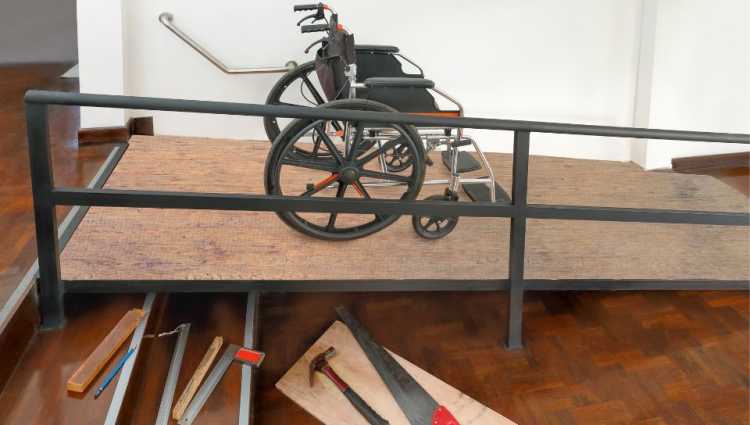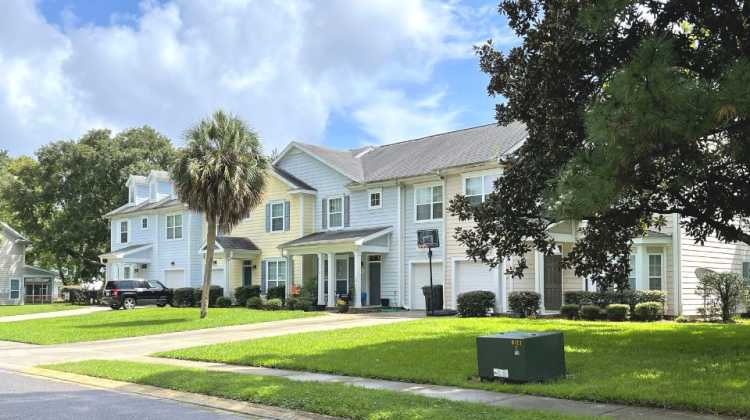VA Grants for Home Improvement: Veteran Housing Assistance
by Becca Stewart - August 12th, 2022

The US Department of Veterans Affairs (VA) provides veteran housing assistance to millions of current and former service members annually. The VA also provides grants to certain disabled and aging veterans. These grants provide necessary financial support for those who gave so much for our country.
Keep reading to learn more about the VA’s housing assistance programs, including VA grants for home improvement and modification, and how you can apply.
Veteran housing assistance
The U.S. Department of Veterans Affairs (VA) offers several housing assistance programs for those who served in the armed forces.
In addition to housing placement services, homeless veteran assistance, and other housing security programs, the VA has several grants to help disabled and aging veterans live more independently in their own homes.
For an in-depth overview of all available veteran housing assistance programs, check out this blog.
VA grants for home improvement
There are three main VA grants for home improvement, all with varying purposes and eligibility requirements:
Specially Adapted Housing (SAH) grant
Special Housing Adaptation (SHA) grant
Home Improvements and Structural Alterations (HISA) grant
These grants are intended primarily for aging or disabled veterans, but others may also qualify.
Specially Adapted Housing grant (SAH grant)
The Specially Adapted Housing grant (SAH) provides financial assistance to veterans with severe disabilities who are building or renovating a home to accommodate their disability.
The SAH grant can be used to construct a new home or make the following changes to increase accessibility:
Installing ramps
Widening doorways
Renovating kitchen spaces to accommodate a wheelchair or other equipment
Modify bathroom facilities
Modify garages, carports, and walkways
Replace doors, windows, and flooring
Other modifications to assist the disabled veteran in living more independently
To be eligible for the SAH grant, veterans must have a documented, severe service-related disability such as:
The loss/loss of use of more than one limb
The loss/loss of use of a lower leg along with lasting effects of an organic disease or injury
Blindness in both eyes (with 20/200 visual acuity or less)
Certain severe burns
The loss/loss of use of both upper extremities limiting the use of the arms at or above the elbows
The loss/loss of use of one lower extremity (foot or leg) after September 11, 2001, which makes it impossible to walk without the help of braces, crutches, canes, or a wheelchair
The veteran must also own their home (or the land on which it will be built) and intend to live in the home for an extended period of time.
SAH grant recipients can receive up to $101,754 (FY 2022) for home improvements and modifications. For more information on the SAH grant and to apply, click here.
Special Housing Adaptation grant (SHA grant)
Like the SAH grant, the Special Housing Adaptation grant (SHA) is intended to help veterans modify or improve their homes for better accessibility. However, the SHA is open to veterans with less severe service-connected disabilities.
Disabled veterans with the following service-connected injuries or illnesses may qualify:
The loss or loss of use of both hands
Certain severe burns
Specific respiratory or breathing injuries
Applicants can receive up to $20,387 (FY 2022) in SHA grant funding. The veteran may use the grant up to three times (up to the capped amount).
To learn more about the Special Housing Adaptation grant (SHA), click here.
Home Improvements and Structural Alterations grant (HISA grant)
Whereas the SAH and SHA grants are only for disabled veterans, HISA grants are open to veterans without service-connected disabilities. HISA grants are available to veterans who are making medically-necessary alterations or improvements to their homes.
Unlike the SAH and SHA grants, the HISA grant does not have a list of qualifying conditions or disabilities. Instead, veterans must submit their application with a written statement from a doctor explaining why the improvement is medically necessary. Conditions related to aging qualify under the HISA.
Approved modifications under a HISA grant include:
Modifying exit and entryways to make them more accessible
Installing or modifying bathroom facilities (roll-in showers, grab bars, etc.)
Modifying kitchen space (counters, cabinets, etc.) for accessibility and safety
Adding ramps to indoor or outdoor areas
Updating electrical or plumbing systems as needed for medical equipment
HISA grants cannot be used for:
Exterior decking
Purchase or installation of spas, hot tubs, or whirlpool bathtubs
Home security systems
Removable equipment like portable ramps, porch lifts, or stair gliders
Routine repairs or maintenance
HISA grants provide a $6,800 lifetime maximum for veterans with a service-connected illness or injury, or veterans with a non-service-connected illness or injury but a 50% disability rating from the VA.
Veterans without a service-connected issue, who do not have a 50% or greater disability rating, can still qualify for a $2,000 lifetime HISA grant.
Grants for temporary housing
All three grants listed above may also be used to modify a temporary housing unit for a disabled veteran. Those living with family members can still apply for VA grants for home improvement under the Temporary Residence Adaptation (TRA) grant.
Veterans are eligible for TRA if they meet the following requirements:
Already qualify for or are approved for a SAH or SHA grant
Living temporarily at a family member’s home (veteran does not need to own the house)
To apply, veterans must fill out the Temporary Residence Adaptation form, available on the eBenefits website.
VA loan program
The VA also offers loan and refinancing programs for current service members, veterans, and retirees, which can be used to build new homes or modify existing properties.
Most military members are familiar with the VA mortgage loan program. Qualified home buyers can use the VA loan to purchase a property with $0 down, lower interest rates, and no private mortgage insurance.
However, current homeowners can benefit from VA lending programs, too. Those eligible (typically current service members, retirees, and certain veterans and family members) can refinance existing mortgages at a lower interest rate, potentially saving thousands of dollars each year.
Additionally, homeowners can refinance using a VA loan, using the equity in their home to do necessary home improvements or repairs. Some homeowners refinance and use the available equity to pay off other debts, pay for a child’s college, or buy additional properties.
Unlike the VA grants for home improvement, VA loans are just that – a loan. They must be repaid with interest, or the borrower risks foreclosure. However, VA loans may be a good option for those who are not eligible for VA grants but need additional funds to complete a project.
Want to learn more about your VA loan options? Click here to connect with a fully-vetted and reviewed military financing specialist in your area.
Learn more about home improvement grants for veterans
If you or a loved one need housing assistance or financial support, reach out to your local veterans’ services agency or contact the U.S. Department of Veterans Affairs.
The VA has a wealth of information on their VA housing programs website.








